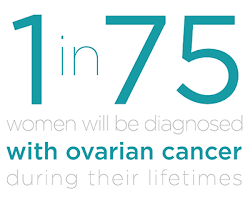
Because symptoms of ovarian and colon cancer overlap quite a bit, women need to be extremely vigilant about what’s going on in their bodies.
Is there a way to tell the difference between ovarian cancer symptoms and those of colon malignancy?
In ovarian cancer, “GI symptoms are common because the ovaries are so close in contact with the GI tract,” says Dr. Maxwell Chait, MD, gastroenterologist at ColumbiaDoctors Medical Group in Westchester County, NY.
“There can be warning symptoms of ovarian cancer and can be present for up to one year before diagnosis.
“They may include intermittent abdominal bloating and distention, change in bowel habits — either diarrhea or constipation often unrelated to meals or specific foods, and lower abdominal pain.”
It’s not uncommon for women with these symptoms to repeatedly visit gastroenterologists to find out what’s wrong, and not even consider seeing a gynecologist.
They may even end up undergoing a colonoscopy (which turns out normal), having no idea that ovarian cancer has brewing all along.
Colon malignancy gets ruled out, and the patient may end up trying all sorts of medications to relieve what she still believes are GI symptoms.
As ovarian cancer becomes more advanced, the symptoms become more persistent and may include unexplained weight loss and urinary problems, adds Dr. Chait.
In ovarian cancer, there are no bloody stools, but this can be a colon tumor symptom.
However, not all CC cases produce visible blood in the stools!
Malignant colon disease can result in very skinny or ribbon-like stools, whereas ovarian malignancy won’t cause this; however, not all colon cancers cause skinny stools!
Both of these diseases can produce the symptoms of:
Alternating Diarrhea with Constipation
Abdominal Pain/Cramping
Unexplained Weight Loss and Fatigue
Appetite Suppression
Bloating
Gas
Nausea
Both can also cause back pain, though OC can cause leg pain and pelvic heaviness that are not part of the symptom repertoire of CC.
Dr. Chait adds the following information:
“If symptoms persist for more than 2-3 weeks, they should see their doctor.
“May first be interpreted as irritable bowel syndrome
“Colon cancer screening is as important for women as for men since no sex difference.” (Screening should begin at age 45 for those at average risk, male or female.)
“You want to find a premalignant lesion as a colon polyp that has no symptoms before a cancer develops.
“GYN exam screening for women with persistent lower GI symptoms.
“You want to find an ovarian cyst or other premalignant lesion before cancer develops.
“Colon and ovarian cancer have an association in the genetic colon cancer disorder HNPCC; 10% of women can also have ovarian cancer.”

Dr. Chait’s practice interests include digestive conditions such as colon cancer, gastrointestinal endoscopy and internal medicine. He has authored numerous publications in reputed journals.
 Lorra Garrick has been covering medical, fitness and cybersecurity topics for many years, having written thousands of articles for print magazines and websites, including as a ghostwriter. She’s also a former ACE-certified personal trainer.
Lorra Garrick has been covering medical, fitness and cybersecurity topics for many years, having written thousands of articles for print magazines and websites, including as a ghostwriter. She’s also a former ACE-certified personal trainer.
.









































